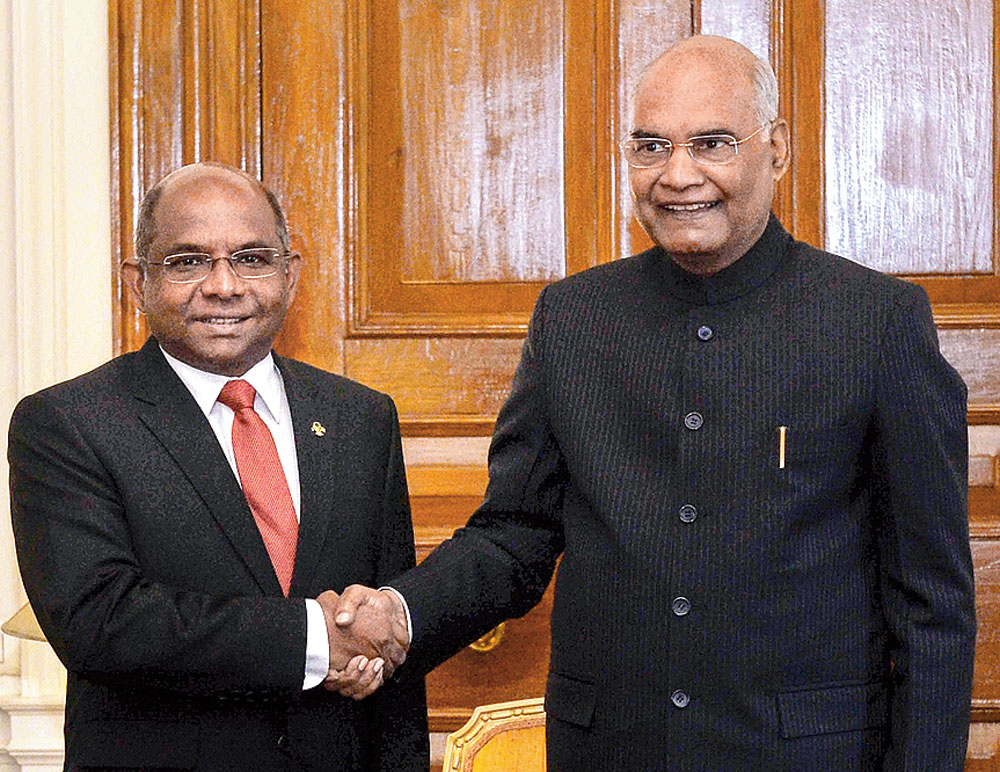India on Monday sought to match China’s deep pockets, pledging $1.4 billion as financial assistance to the Maldives to help the new government in the atoll nation ride the financial crisis it has inherited from Abdulla Yameen’s authoritarian regime.
The amount, mentioned in a joint statement, matches the size of Male’s debt to Beijing, according to an announcement that Maldivian finance minister Ibrahim Ameer had made a fortnight back. Ameer had said that his country’s total external debt was around $1.8 billion, of which it owed $1.4 billion to China alone.
The Yameen government had never disclosed the amount of loan the Maldives had taken from China, although studies had indicated that the archipelagic nation was in a debt trap, primarily through the enticing lending Beijing offered to get countries on board its ambitious Belt and Road Initiative (BRI).
The Washington-based Centre for Global Development had earlier this year listed the Maldives among the top eight countries highly vulnerable to debt distress because of the BRI.
Delhi’s financial assistance will be in the form of budgetary support, which does not have to be returned; currency swap and concessional lines of credit. There was no official word on the exact break-up.
India and the Maldives already have a currency-swap agreement but Male had, in the preparatory meeting for Monday’s summit-level engagement between Prime Minister Narendra Modi and President Ibrahim Mohamed Solih, urged Delhi to extend it to six months from the existing three and increase the amount from $200 million.
From their very first meeting exactly a month ago when Modi had travelled to Male for Solih’s inauguration, the President had sought India’s help in meeting the budget deficit as the two countries began working on putting the bilateral relationship back on track.
Yameen had tilted his country towards China and followed an isolationist policy.
The Maldives on Monday reaffirmed its commitment to an “India First Policy” that had taken a beating under Yameen’s watch. The two leaders also agreed on a new visa agreement to facilitate travel both ways.
Over the past year, as relations between the two countries soured, Maldivian business establishments were discouraged from recruiting Indians. The visa agreement is aimed at reversing that trend.
Likewise, Maldivians who send their children to India for schooling will be able to accompany them. Also, travel to India for medical purposes has been made easier for Maldivians.
This, in turn, would further help India become a healthcare hub in the region.
The two sides also agreed to enhance maritime security cooperation in the Indian Ocean region through coordinated patrolling and aerial surveillance, exchange of information and capacity-building.
While the joint statement identified several areas of convergence, there was no mention of the contentious Free Trade Agreement (FTA) that Yameen had signed with China and rammed through the Maldivian parliament.
Last month, on his preparatory visit to India for Monday’s summit, Maldives foreign minister Abdulla Shahid had told reporters the FTA was being studied in detail and the Solih government had taken a conscious decision not to talk about it till it had been analysed threadbare.
“The new attorney-general is looking at the 1,000-page document and we have decided to talk about it only after a proper review,” Shahid had said, asked about the year-old FTA, while underscoring
that Male would tread cautiously as China had been “generous” even before the Yameen era.











